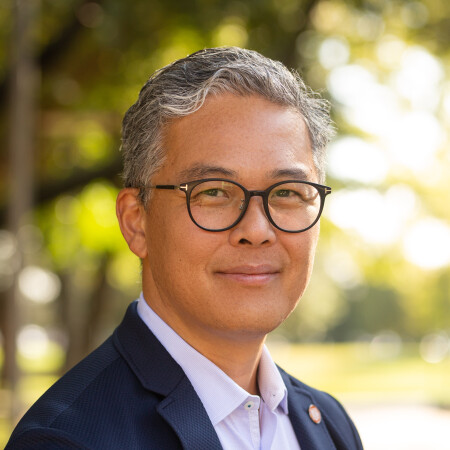Ph.D. - Biochemistry
Harvard University

Tae Hoon Kim
Professor - Biological Sciences
Professional Preparation
M.A. - Molecular and Cellular Biology
Harvard University
Harvard University
B.A. - Biology
Reed College
Reed College
Research Areas
My laboratory has a broad and deep interest in understanding nuclear processes and mechanisms that segregate, fold and unfold chromosome fibers and disease causing changes that disrupt normal location, arrangement and interpretation of the human genome. Over the past decade and half, we have made seminal discoveries regarding active and poised promoters; sequence determinants of insulator protein CTCF occupancy and evolution; developmentally regulated looping of chromosomes in the human genome; and transcription elongation control mechanisms.We innovate and disseminate new functional genomics frameworks, techniques and approaches. Through close collaborations, we have also uncovered new insights into cis-regulatory architectures of several critical regulators of development and diseases. We are leveraging our expertise in functional genomics to investigate diverse aspects of human health and disease ranging from innate immunity to chronic pain.Publications
Targeting the Glucose–Insulin Link in Head and Neck Squamous Cell Carcinoma Induces Cytotoxic Oxidative Stress and Inhibits Cancer Growth 2025 - Journal Article
Tailored modulation of gene regulation programs via functional enhancer RNA 2024 - Patent
Targeting the glucose-insulin link in head and neck squamous cell carcinoma induces cytotoxic oxidative stress and inhibits cancer growth 2023 - Other
Oxidative Stress and the Intersection of Oncogenic Signaling and Metabolism in Squamous Cell Carcinomas 2021 - Journal Article
The S-phase-induced lncRNA SUNO1 promotes cell proliferation by controlling YAP1/Hippo signaling pathway. 2020 - Journal Article
YAP and TAZ maintain PROX1 expression in the developing lymphatic and lymphovenous valves in response to VEGF-C signaling. 2020 - Journal Article
YAP and TAZ maintain PROX1 expression in the developing lymphatic and lymphovenous valves in response to VEGF-C signaling 2020 - Data Set
Awards
Stewart Trust Scholar Award (Pew-Stewart Scholar Award) - [2011]
Sidney Kimmel Scholar Award - [2008]
Rita Allen Scholar Award - [2007]
AACR Edward A. Smuckler Memorial Workshop Scholarship - [2006]
Korean American Scientists and Engineers Association Young Investigator Award - [2006]
James Kerr Award, Ludwig Institute for Cancer Research, San Diego, CA - [2005]
Selected Participant of International Workshop on Encoding Information in DNA Sequences in Japan - [2005]
Selected Participant of Frontiers of Human Embryonic Stems Cells - [2005]
Ruth L. Kirschstein National Research Service Award - [2004]
Distinction in Teaching Award, Harvard University - [2002]
Appointments
Professor
The University of Texas at Dallas [2025–Present]
Department of Biological Sciences
The University of Texas at Dallas [2025–Present]
Department of Biological Sciences
Department Head
The University of Texas at Dallas [2019–2023]
Department of Biological Sciences
The University of Texas at Dallas [2019–2023]
Department of Biological Sciences
Associate Professor
The University of Texas at Dallas [2014–2025]
Department of Biological Sciences
The University of Texas at Dallas [2014–2025]
Department of Biological Sciences
Associate Professor
Yale University [2013–2014]
Department of Genetics
Yale University [2013–2014]
Department of Genetics
Assistant Professor
Yale University [2006–2013]
Department of Genetics
Yale University [2006–2013]
Department of Genetics
Postdoctoral Fellow
University of California at San Diego [2002–2006]
Ludwig Institute for Cancer Research
University of California at San Diego [2002–2006]
Ludwig Institute for Cancer Research
Teaching Fellow
Harvard University [1998–2002]
Department of Molecular and Cellular Biology
Harvard University [1998–2002]
Department of Molecular and Cellular Biology
News Articles
Where Does Chronic Pain Begin? Scientists Close In on Its Origins
 A new study by researchers at The University of Texas at Dallas, UT MD Anderson Cancer Center, UT Health Science Center at Houston and Baylor College of Medicine has produced evidence of the source of chronic pain in humans, revealing several new targets for pain treatment.
A new study by researchers at The University of Texas at Dallas, UT MD Anderson Cancer Center, UT Health Science Center at Houston and Baylor College of Medicine has produced evidence of the source of chronic pain in humans, revealing several new targets for pain treatment.The paper — published March 19 in Brain, one of the world’s oldest neurology journals — examined specialized nerve cells clustered near the base of the spine. Researchers took advantage of an exceedingly rare opportunity to study these nerves, called dorsal root ganglia (DRG), removed from cancer patients undergoing surgery at MD Anderson.
Affiliations
Member
2005/05American Association for Cancer Research